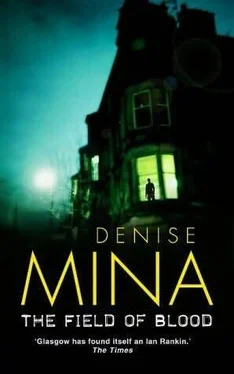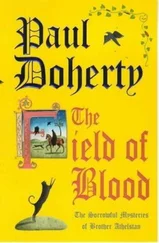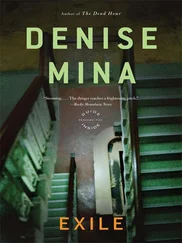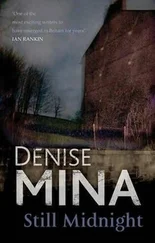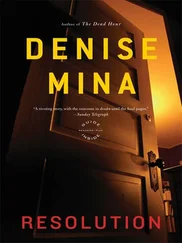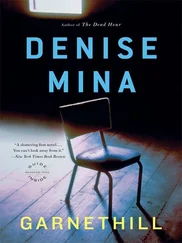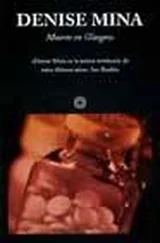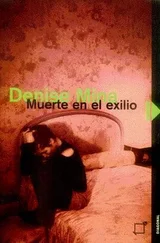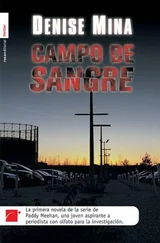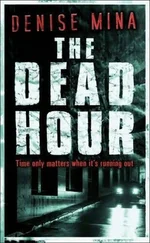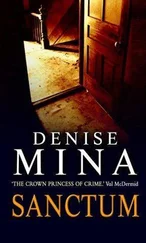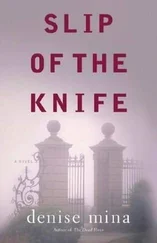Denise Mina - Field of Blood
Здесь есть возможность читать онлайн «Denise Mina - Field of Blood» весь текст электронной книги совершенно бесплатно (целиком полную версию без сокращений). В некоторых случаях можно слушать аудио, скачать через торрент в формате fb2 и присутствует краткое содержание. Жанр: Триллер, на английском языке. Описание произведения, (предисловие) а так же отзывы посетителей доступны на портале библиотеки ЛибКат.
- Название:Field of Blood
- Автор:
- Жанр:
- Год:неизвестен
- ISBN:нет данных
- Рейтинг книги:3 / 5. Голосов: 1
-
Избранное:Добавить в избранное
- Отзывы:
-
Ваша оценка:
- 60
- 1
- 2
- 3
- 4
- 5
Field of Blood: краткое содержание, описание и аннотация
Предлагаем к чтению аннотацию, описание, краткое содержание или предисловие (зависит от того, что написал сам автор книги «Field of Blood»). Если вы не нашли необходимую информацию о книге — напишите в комментариях, мы постараемся отыскать её.
Field of Blood — читать онлайн бесплатно полную книгу (весь текст) целиком
Ниже представлен текст книги, разбитый по страницам. Система сохранения места последней прочитанной страницы, позволяет с удобством читать онлайн бесплатно книгу «Field of Blood», без необходимости каждый раз заново искать на чём Вы остановились. Поставьте закладку, и сможете в любой момент перейти на страницу, на которой закончили чтение.
Интервал:
Закладка:
He opened the passenger door for her. “He didn’t phone back?”
“Not once.” She climbed into the seat and waited until Terry was in the driver’s side. “Wouldn’t even come to the phone when I called him. Nothing.”
“He sounds like a spineless wee shite.” He started the engine. “But I would say that, wouldn’t I?”
For the first time in her life, Paddy felt like a full-grown woman.
III
Barnhill was a brutal landscape. The barren little hill of low-slung houses sat tight against the windy hill, cowering from swooping gangs of black crows. It was hemmed in to the east and west by high-rise flats soaring thirty stories up into a big gray sky. The high flats were built with asbestos, tissue, and spit; victims of running damp, they were popular with no one but shit-machine pigeons. To the south, between Barnhill and the city, sat the sprawling St. Rollox engineering works, which had supplied train carriages to half the Empire. The two institutions went into decline hand in hand, and gradually the surrounding land was abandoned, left littered with chemical residues and bits of scrap, contaminated and useless.
Barnhill itself was little more than a circuit of five or six long streets of identical houses, a squat row of shops with a turret at the corner, a post office, and a school. The recent recession showed in the area. The shopping bags the women carried were all from discount shops, and men, white faces crumpled against the brazen rain, gathered outside the bookies and the pub, too broke to go in.
“This place is a shithole,” Paddy said.
“It’s not that bad,” said Terry, who would never have to countenance living there.
He pulled the car out onto the bleak Red Road. The road dipped between two soot-blackened walls and suddenly they were around the corner from the house. Paddy slid down in her seat, imagining that Sean and all the Ogilvys would be standing around in groups on the curb as they had been on the day of Callum’s father’s funeral, dressed in sombre blacks and grays, saying good-bye to Callum Ogilvy’s mother, making hollow promises to see her again soon.
The Ogilvy house was on a sharp hillside. Crumbling concrete steps led up to it, and the grass in the steep front garden was knee-deep. Paddy wasn’t certain that she would be able to remember which house it was, but someone had helpfully aerosoled FILTH OUT on the wall at the bottom of the garden.
The living room window was boarded over. The house might have been abandoned, but the front door was opened a little and bits of plastic toys were scattered across the front garden, while a stuffed pink thing with balding patches lay on a cushion of lush green grass, soaking up the rain. As they cruised slowly past the house Paddy saw a small leg in brown flares sticking backwards out of the front door, swaying on the toe as if a coy child had turned back into the house to ask a question.
Paddy sat back deep in her seat, watching the sad house pass. Quite suddenly the weight of her family and Sean’s disapproval seemed justified. If women didn’t conform, this is what happened. She would end up in a rundown council house with a hundred starving children and no extended family to help out during the hard times. It took her a tearful moment to remember that she hadn’t done anything wrong.
She turned and looked at Terry, desperate to think about something else. He was looking ahead, unaware of her for the moment, thoughtlessly slacking saliva around with his tongue. The sound made her stomach warm.
“What are you smiling at?” he asked.
“Nothing.”
They were driving down a short connection between two long roads when they saw what they were sure was the other Baby Brian Boy’s house. It was on the ground floor of a four-in-a-block cottage, and below the window, starting from the ground, a sooty trail sprang up the brickwork where someone had tried to set a fire. Fresh putty was still unpainted where the window had been replaced, light still catching a linseed-oil glisten. Even before the vandalism, Paddy could see, it wasn’t a wealthy home. The curtains were faded and dusty, the patchy grass was overgrown in the front garden, and the drive up to the door was so potholed that it couldn’t have been used by a car in a long time.
Terry gunned the engine. “Let’s go to Townhead and see the layout there.”
The rain came on as they drove down the broad dual carriageway through Sighthill. The high flats there were monolithic walls of homes, standing sentry on the summit of a small hill. The only other feature in the area was a large cemetery, not high Victorian but a poor person’s cemetery of small gravestones marshaled into neat rows. The wind pushed the rain sideways, into the faces of the pedestrians, catching the legs of people cowering in bus shelters. It took eight minutes in the car to cover the distance between the Baby Brian Boys’ houses and the Wilcox home. By the time they arrived in Townhead the rain had stopped, leaving the streets dark and glistening.
Even with the car windows up and the noisy engine running they could hear the hunger strikers’ march three blocks away. Hundreds of male voices shouted in unison, chanting through the silent city. Paddy had been on nuclear disarmament marches, where the noise was less aggressive, the chanting mellowed by women’s voices, but this sounded different: they sounded like a wild army. Every so often a call would go out and be answered by the mob. Whichever way they turned, the sound seemed to be getting closer.
Following Paddy’s directions they found the Wilcox house and pulled up by the sidewalk. A few small bunches of posies had been added to the display of drooping yellow ribbons on the railings. Apart from that the house looked the same as it had when she’d come with McVie, but the streets were deserted. Even though it was Saturday the children on the scheme had been forbidden to play in the street because of the trouble there would be in town. A wave of sound rolled up the hill from the march.
“I like this,” said Terry. “I like cruising around with you, playing at journalists.”
She nodded. “So do I. I’ll be Bob Woodward.”
“I’ll go Bernstein, just this once.” He smiled. “D’you ever wonder how those guys felt as they fell asleep at night? They didn’t just report miscarriages of justice, they corrected them. How cool is that? That’s what I want to do.”
“Me too,” said Paddy, breathless and startled at how perfectly he had articulated her lifelong ambition. “That’s all I’ve ever wanted to do.”
They looked at each other, for once nothing between them, eye to eye. She couldn’t look away, didn’t want to in case he was going to say something, and he stared back. They sat there for a moment, stuck like dogs, panic rising in Paddy’s throat, until they tore their eyes away, cleared their throats, and caught their breath. She thought she heard him mutter an exclamation, but was too embarrassed to ask what it was.
“Look.” Her sudden voice filled the car, and she pointed ahead to Gina’s house. “There’s the alley to the swing park.”
“Is it? Yeah? Is that it? Did they come down here?”
“No one saw them, but the police still think so.” She turned to look at him but lost her nerve and stared at his ear.
They heard it before they saw it, high-pitched and carried on the cold air, less a tune than a collection of notes. The ice-cream van was coming. From front doors and gardens small children began to appear on the pavements. Paddy turned in her seat, watching back down the road to where they were gathering in the car park. Something about it bothered her.
The queue was small for a Saturday afternoon. A young mum with a baby on her hip and a dirty-faced toddler, chaperoned by an older sister, watched the road expectantly, the young excited at the proximity of sugar, the older ones drawing together, glancing around, defensive and careful because of what had happened to poor Brian Wilcox.
Читать дальшеИнтервал:
Закладка:
Похожие книги на «Field of Blood»
Представляем Вашему вниманию похожие книги на «Field of Blood» списком для выбора. Мы отобрали схожую по названию и смыслу литературу в надежде предоставить читателям больше вариантов отыскать новые, интересные, ещё непрочитанные произведения.
Обсуждение, отзывы о книге «Field of Blood» и просто собственные мнения читателей. Оставьте ваши комментарии, напишите, что Вы думаете о произведении, его смысле или главных героях. Укажите что конкретно понравилось, а что нет, и почему Вы так считаете.
